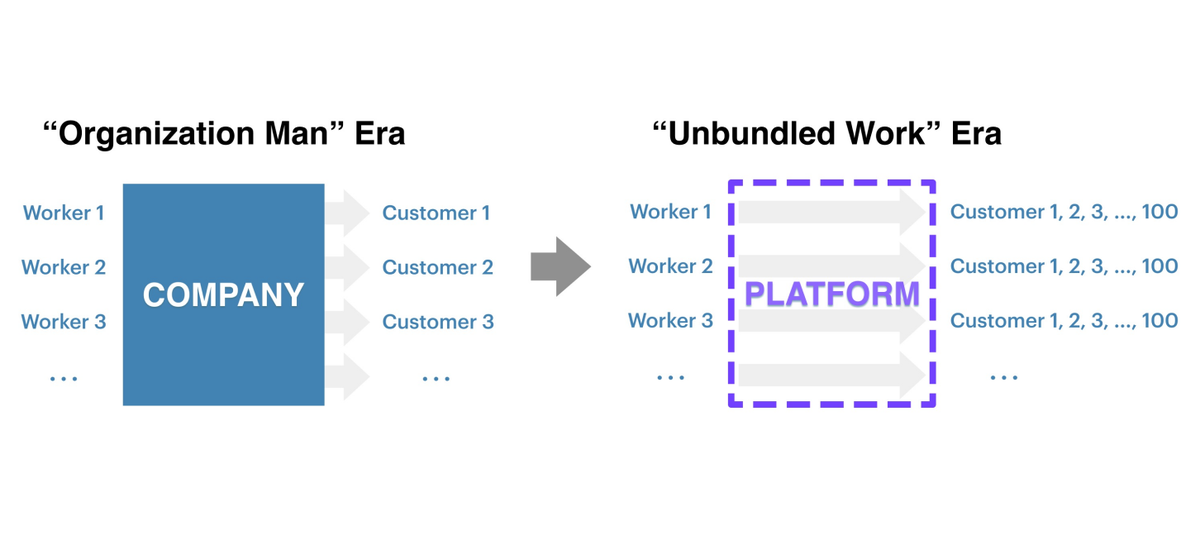
In 1935, the US enacted various New Deal cultural programs to provide relief for jobless artists and democratize public access to art.
A century later, it’s time to renew that spirit.
Enter: Universal Creative Income 🪙
New blog by me & @lilashroff
li.mirror.xyz/j3WsyvI5LKFKcF…
A century later, it’s time to renew that spirit.
Enter: Universal Creative Income 🪙
New blog by me & @lilashroff
li.mirror.xyz/j3WsyvI5LKFKcF…
Universal Creative Income is basic income for online creators. This may sound really fringe, but bear with me!
There are 2 broad ways that UCI can come to fruition, outlined in the blog post:
1) Platform-funded UCI
2) Crypto UCI, with governance decisions made by the community
There are 2 broad ways that UCI can come to fruition, outlined in the blog post:
1) Platform-funded UCI
2) Crypto UCI, with governance decisions made by the community
The New Deal was essentially a small-scale experiment in UCI, with employment for 10K+ artists who created over 100K works.
Importantly, it shifted the perception of art from a luxury good, funded via private patronage, to a critical part of a democracy.
64parishes.org/entry/federal-…
Importantly, it shifted the perception of art from a luxury good, funded via private patronage, to a critical part of a democracy.
64parishes.org/entry/federal-…
The present day mirrors the 1930s in many ways, with widespread job loss, a broad sense of burnout, and a need to bridge divides.
COVID-19 has exacerbated income inequality. The creator economy, which already had lacked a middle class, needs more on-ramps than ever.
COVID-19 has exacerbated income inequality. The creator economy, which already had lacked a middle class, needs more on-ramps than ever.
Today, there is widespread access for creative work: social media platforms enable users to consume a vast universe of creators' work at no expense.
But the ad model and digital nature of content have undermined the economic viability of content creation online.
But the ad model and digital nature of content have undermined the economic viability of content creation online.
Universal Creative Income, the modern-day form of New Deal-esque art funding, is most likely to come from platforms.
Companies can apportion some revenue to fund UCI for emerging creators on the platform, and provide a monthly stipend to those creators.
Companies can apportion some revenue to fund UCI for emerging creators on the platform, and provide a monthly stipend to those creators.
While there have been numerous creator funds that pay successful creators (e.g. TikTok), our hypothesis is that funding the long-tail of creators can create more business impact than funding top creators who can already monetize in myriad ways.
Creators would need to meet certain eligibility criteria to receive funding, and would be phased out of the program after a set duration. That way, everyone gets a shot, but the platform isn't on the hook to pay the same long tail of creators forever.
A UCI program targeted at emerging creators can engender more creator loyalty and build a proprietary acquisition channel for the next generation of talent.
(it's like being YC vs. chasing hot growth deals)
(it's like being YC vs. chasing hot growth deals)
UCI would be esp. beneficial in boosting participation among diverse creators.
Just as unpaid internships exclude students from lower-income backgrounds, the current creator paradigm of amassing a free audience before eventually monetizing locks out less well-off creators.
Just as unpaid internships exclude students from lower-income backgrounds, the current creator paradigm of amassing a free audience before eventually monetizing locks out less well-off creators.
Successful implementation of UCI would bring improvements in creator stress and mental health, and create a more equitable path for a more diverse array of creators to be able to pursue content creation as a career.
While UCI may appear to be predicated on altruism on the part of companies, there are tangible business benefits that could make such a program a worthwhile investment.
UCI can better align creator & platform incentives, yielding more + better content that drives user engagement
UCI can better align creator & platform incentives, yielding more + better content that drives user engagement
As an alternative to platform-funded UCI, crypto could also be used to implement more transparent and democratic forms of artist funding. A community treasury could use a portion of its holdings to fund a UCI program.
Rather than a centralized company making unilateral decisions about UCI, users and creators of the DAO would participate in governance decisions.
With pandemic-induced job insecurity and heightening income inequality, it is more pressing than ever to enact programs that create broader on-ramps for creator success.
Universal Creative Income can be a step in this direction.
Universal Creative Income can be a step in this direction.
MUCH more detail in the blog post—go read!
We hope that the ideas and solutions outlined in this essay are considered starting points in a longer conversation. How should we fund creators and foster the creator economy?
li.mirror.xyz/j3WsyvI5LKFKcF…
We hope that the ideas and solutions outlined in this essay are considered starting points in a longer conversation. How should we fund creators and foster the creator economy?
li.mirror.xyz/j3WsyvI5LKFKcF…
I first touched on Universal Creative Income in my blog post about building the creator middle class. UCI was 1 of 10 suggestions that I outlined for how we can help more creators prosper.
Refresh:
li.substack.com/p/building-the…
Refresh:
li.substack.com/p/building-the…
Major thank you to @notscottmoore @patrickxrivera @jessewldn @Cooopahtroopa @gabusch @jamesyoung @jonippolito @XJaravel @skominers @henhen for making me smarter & for your inspiration.
Props to @chejazi and @maxbrody who coined "Universal Creative Income," and @niftytime who wrote about it here, a full 2 years ago!
beta.cent.co/matthew/+lx3x2g
beta.cent.co/matthew/+lx3x2g
• • •
Missing some Tweet in this thread? You can try to
force a refresh



